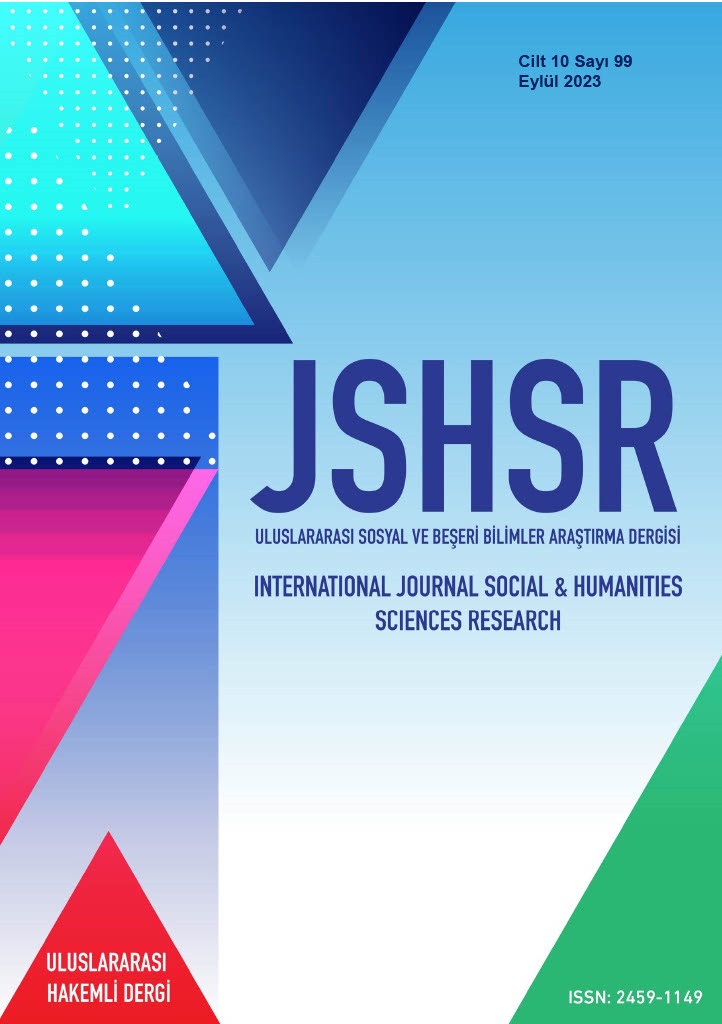A Qualitative Research on Syrian Migration in The Context of Social Change
DOI:
https://doi.org/10.5281/zenodo.8396608Keywords:
Change, Social Change, Migration, Syrian Migration, Qualitative ResearchAbstract
Migration is accepted as a serious turning point in the lives of societies as well as individuals. With the phenomenon of migration, it is inevitable that the society, which is both immigrant and exposed to immigration, does not change socially, culturally and economically. The aim of this study is to investigate whether the Syrian migration to Turkey with the Syrian war caused a social change in Sakarya and the Syrian refugees, and if so, to what extent the social change took place. Ethics committee approval for the research was obtained with the decision numbered 2023-SBB-0017 of the Social and Human Sciences Ethics Committee of the University of Sakarya, ...meeting dated 18.01.2023 and numbered 01.In the study, in which the qualitative research method was used, the data were obtained through in-depth interviews conducted in line with the questions created by the researcher. Sakarya constitutes the universe of the research. The research was carried out in Tığcılar, Hızırtepe and Semerciler Neighborhoods, where Syrians mostly live in Sakarya. Within the scope of the research, in-depth interviews were conducted with the local people in Sakarya and temporary Syrian refugees. The sample group to be selected consists of a total of 40 people, including 20 Syrians, 10 men and 10 women, and 20 participants from Sakarya, 10 men and 10 women. According to the information obtained as a result of the research, the participants from Sakarya think that there is no social change in Syrians because Syrians are constantly together, but there are social and cultural changes in Sakarya and they narrow their job opportunities economically. The majority of Syrian participants, on the other hand, are of the opinion that there is no change because the two communities are very similar to each other. The opinion that there is no change in the lives of the Syrian participants is considered a consistent result for the two participant groups. It is seen that the participants from Sakarya do not want to think about a common future due to the differences between the two communities, and the Syrian participants, on the contrary, point out that a common future is possible because the two communities are very similar to each other, but the prejudice of the local people can prevent this.
References
Aksoy, Z. (2012). Uluslararası göç ve kültürlerarası iletişim, Uluslararası Sosyal Araştırmalar Dergisi, 5(20), 292-303.
Appelbaum, R P. (1987). Toplumsal Değişim Kuramları. Türkiye İş Bankası Kültür Yayınları.
Arık, A. (1998). Psikolojide Bilimsel Yöntem. Çantay Kitabevi.
Baltacı, A. (2019). Nitel araştırma süreci: Nitel bir araştırma nasıl yapılır? Ahi Evran Üniversitesi Sosyal Bilimler Enstitüsü Dergisi, 5(2), 368-388.
Burmeister, E., & Aitken, L.M. (2012). Sample size: How many is enough? Australian critical care, 25(4), 271-274.
Cohen, L., Manion L. & Morrison K. (2005). Research methods in education. Routledge Falmer. Taylor & Francis e-Library.
Creswell, J. W. (1994). Research design: Qualitative & quantitative approaches. Sage Publications.
Demir, G. (1997). Göç Nedenleri ve Göçmenlerin Beklentilerindeki Gerçekleşme Durumu: Bolu İli Kıbrıscık İlçesi Örneği. II. Ulusal Sosyoloji Kongresi Toplum ve Göç (s.79). Ankara.
Doğan, İ. (1995). Sosyoloji. Sistem Yayıncılık.
Doğan İ. (2012). Sosyolojik Kavramlar ve Sorunlar. Pagem.
Dönmezer, S. (1994). Toplumbili. Beta Yayınevi.
Durugönül, E. (1997). Sosyal Değişme, Göç ve Sosyal Hareketler, II. Ulusal Sosyoloji Kongresi Toplum ve Göç (s.97). Ankara.
Emniyet Genel Müdürlüğü Yabancılar Hudut İltica Dairesi Başkanlığı (2001). Dünya’da ve Türkiye’de Yasadışı Göç Raporu. Ankara.
Erkal, M. E. (2000). Sosyoloji. Der Yayınları.
Gray, P. S. & Williamson, J. B., Karp, D. A. and Dalphin, J. R. (2007). The research imagination: An introduction to qualitative and quantitative methods. New York, Cambridge University Press.
Güler, A., Halıcıoğlu, M. B. ve Taşğın, S. (2015). Sosyal Bilimlerde Nitel Araştırma. Seçkin Yayıncılık.
İşçi, M. (2000). Sosyal Yapı ve Sosyal Değişme. Der Yayınları.
Kalaycıoğlu, E. (1984). Siyasal Bilim (Teori, Olgu ve Süreç). Beta Yayın.
Karpat, K. H. (2013) Osmanlı’dan Günümüze Etnik Yapılanma ve Göçler. Timaş Yayınları.
Koca, C. (2017). Spor bilimlerinde nitel araştırma yaklaşımı. Spor Bilimleri Dergisi, 28(1), 30-48
Mülteciler Derneği (2023). Türkiye’de Suriyeli Sayısı. Erişim Adresi: https://multeciler.org.tr/turkiyedeki-suriyeli-sayisi.
Nakhoul, T. E. (2014). Uluslararası İşgücü Göçü ve Türkiye. [Uzmanlık Tezi]. Çalışma ve Sosyal Güvenlik Bakanlığı Dış İlişkiler ve Yurtdışı İşçi Hizmetleri Genel Müdürlüğü.
Okumuş, E. (2003). Toplumsal Değişme ve Din. İnsan Yayınları.
Öner, S. & Kaçmazoğlu, H. B. (1997). Güneydoğu Anadolu ve Göç: Göç Olgusu ve Doğu Anadolu, II. Ulusal Sosyoloji Kongresi-Toplum ve Göç, s.371
Özkalp, E. (1995). Sosyolojiye Giriş. Anadolu Üniversitesi Yayınları.
Özkalp, E. (1997). Sosyoloji. Anadolu Üniversitesi Yayınları
Öztürk, M. & Coşkun M. K. (1999). Sosyoloji. MEB Yayınları
Patton, M. Q. (1987). How to use qualitative methods in evaluation, program evaluation kit. California: Sage Publications.
Rubin, H. J. & Rubin, I. S. (2005). Qualitative interviewing: The art of hearing data. California: Thousand Oaks, Sage Publication
Sağır, M. (1997). Sivas’ta Kentleşme İşsizlik ve Göç, II. Ulusal Sosyoloji Kongresi-Toplum ve Göç (s.379). Ankara.
Sağlam, S. (2006). Türkiye'de iç göç olgusu ve kentleşme. Türkiyat Araştırmaları, 5, 33-44
Tezcan, M. (1995). Toplumsal Değişme. Feryal Matbaası.
Tümtaş, M. S. (2012). Kent, Mekân ve Ayrışma. Detay Yayınları.
Tümtaş, M. S. & Çelı̇kkalelı̇ Ö. (2014) Kente Göç Sosyal Dışlanmışlık ve Ergenlerdeki Psikolojik Belirtileri, (Ed.) Keçelı̇, A. ve Çelı̇koğlu, Ş., Kent Çalışmaları I içinde, (ss: 41-66). Detay Yayıncılık.
Yağar, F., & Dökme, S. (2018). Niteliksel Araştırmaların Planlanması: Araştırma Soruları, Örneklem Seçimi, Geçerlik ve Güvenirlik. Gazi Sağlık Bilimleri Dergisi, 3(3), 1-9.
Yıldırım, A. & Şimşek, H. (2000). Sosyal Bilimlerde Nitel Araştırma Yöntemleri. Seçkin Yayıncılık.
Downloads
Published
How to Cite
Issue
Section
License
Copyright (c) 2023 INTERNATIONAL JOURNAL OF SOCIAL HUMANITIES SCIENCES RESEARCH

This work is licensed under a Creative Commons Attribution 4.0 International License.


